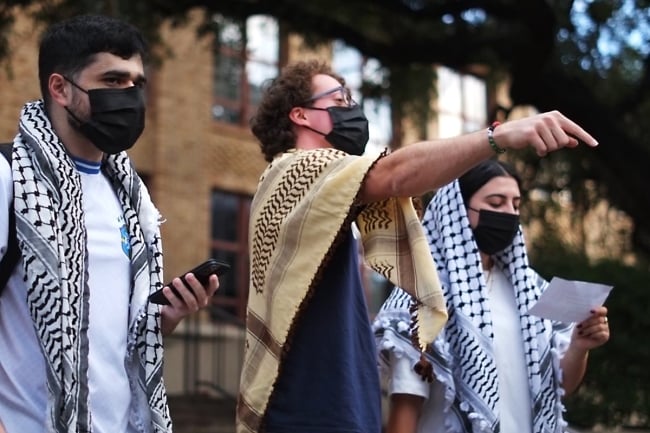You have /5 articles left.
Sign up for a free account or log in.

Students demonstrate at a Dec. 8 protest of the University of Texas at Austin’s removal of two teaching assistants.
Iliana Figueroa
Around late October or early November, a University of Texas at Austin student in a course called Women and Madness asked the instructors to “acknowledge the mental health needs of Palestinian, Arab and Muslim students,” according to a now-former teaching assistant for the class.
“The request was simply, could the lecture class address the mental health needs of Palestinian, Arab and Muslim people right now given what’s happening,” said Callie Kennedy, one of the two ex-TAs. She said the student brought it up in a smaller discussion section of the course but wanted the full, 100-student lecture class to address it.
Kennedy said the Women and Madness professor, Lauren Gulbas, declined that request, saying it was an emotional and fraught issue. So Gulbas, Kennedy and the other TA, Parham Daghighi, worked together on an alternative: issuing a statement that would also provide students with mental health resources.
The TAs said they worked for an hour to collectively edit the statement, and Gulbas—after expressing some concern at the end of their meeting about retaliation other faculty members have faced for speaking out on the issue—gave them approval to distribute it, but without her name attached. The TAs posted the message the morning of Nov. 16, on the class’s Canvas learning management platform.
“As Women & Madness is a class that is heavily oriented around mental health, we wanted to send a message to acknowledge the mental health implications of the current escalation of violence in Gaza,” they wrote, according to a copy of the message they provided to Inside Higher Ed. “As your teaching assistants, we feel it is important to be clear that we do not support the University’s silence around the suffering many of our students, staff, and faculty are experiencing on campus. For example, there was harassment of students at the Palestinian Solidarity Committee teach-in last month. Such discrimination perpetuates harm.
“In an effort to lift up the request for support from students, we’ve curated some resources below,” the message said. “If you are familiar with other resources you would like to share, please feel free to send them our way and we will share them with the group at large. For any students experiencing mental health challenges, please remember that you are not alone and we are here to support you.”
The last paragraph included this language: “We firmly support the rights and autonomy of Palestinians, Indigenous people, and displaced peoples across the globe, knowing that oppression results in trauma and negative mental health outcomes that can span generations. If you have any questions or concerns, please feel free to be in touch.”
That evening, the TAs said, Gulbas informed them that there had been a complaint. On Nov. 17 she told them it was from a Jewish student, they said. They said they then heard nothing from Gulbas or the administration until Nov. 22, when, Daghighi, the other former TA, said, “We awoke to dismissal letters.”
The letters were signed by Allan Cole, dean of the Steve Hicks School of Social Work, and they said the TAs’ message “shows that you lack the professional judgment required for this role.”
Cole, who didn’t provide Inside Higher Ed an interview Tuesday, wrote that the TAs “sent an unprompted message about the war in Israel to the Women and Madness course”—one that was “unrelated to the course and inappropriate given the setting” and that lacked “approval of the supervising faculty member.”
“Given this, I can no longer trust you as a teaching assistant,” the letter says. “Effective immediately, you are relieved of this work assignment and will not have contact with the students.” It said they’d still be paid this fall, but “you will not be reappointed as a TA next semester.”
The university didn’t provide Inside Higher Ed with interviews for this story and declined to answer multiple questions. It didn’t provide its own copy of the message it ousted the TAs for sending.
The TAs said they have a text message from Gulbas giving them the go-ahead to send their message, but they didn’t provide it Tuesday. Daghighi said they’re in the midst of an internal grievance proceeding over their dismissal, and he’s concerned about releasing that document publicly before it’s brought forth in a hearing.
The professor, Gulbas, did not return requests for comment Tuesday.
Daghighi said his and Kennedy’s ouster and the university’s public statements on it are “pretty scary” in a climate where students and faculty members “who speak in support of the Palestinian struggle” are being doxed, harassed and fired. Since Hamas’s Oct. 7 terrorist attack on Israel, multiple faculty members have been censored, investigated or punished by universities or professional associations for pro-Palestinian speech.
Referring to other incidents of suppression of pro-Palestinian speech, Kennedy said, “We absolutely do not think this is an isolated incident. I think this very much fits in line.” And, she said, “it’s now very public information that our character has been called into question.”
Daghighi said, “Being slandered on a very large stage” by a powerful institution such as UT Austin is “pretty troubling.”
AAUP, Students Protest
“It seems to be a threat even to say you support Palestinian students on your campus,” said Karma Chavez, a professor of Mexican American and Latina/o studies who’s on the executive committee of UT Austin’s American Association of University Professors chapter.
“We’re concerned about violations of academic freedom,” she said, “and from the evidence we have, that’s what it looks like.”
Chavez said, “TAs make missteps all the time,” and professors should correct them. But, she said, it’s “very hard for me to imagine sending a message out about mental health,” in a class about mental health, would cause the university to respond this way—if the message weren’t about the war in Gaza.
Kennedy provided letters of support for her and Daghighi’s reinstatement from the Council on American-Islamic Relations, the Middle East Studies Association of North America and the executive committee of UT Austin’s AAUP chapter. The AAUP letter contends, as do the TAs, that the university didn’t follow due process in immediately disciplining them. But the university contends what it did wasn’t discipline at all; one university spokesman told Inside Higher Ed the two were “administratively reassigned.”
The AAUP letter notes that Women and Madness is considered a “signature course,” one that’s supposed to involve sharing resources with students. “Sharing mental health options is something that Signature Course faculty are explicitly asked to do by the Undergraduate College, given that such courses are intended in part to introduce first-year students to UT resources,” it says.
In an emailed statement to Inside Higher Ed, the university said, “Leadership in the School of Social Work appropriately managed conduct by two teaching assistants who, while acting in their role as employees, unprofessionally misused the official University classroom communication platform to send a personal political message to the students in a course. This is inconsistent with the recent statements made by the teaching assistants, who now suggest their message was merely an attempt to share mental health resources and that the content of the message was related to the course.”
On Dec. 8, in protest of the TAs’ removal, a small group of students tried to deliver written demands to Cole, said Ammer Qaddumi, a student and a member of the steering committee for the Palestine Solidarity Committee. He said that organization is UT Austin’s arm of the national Students for Justice in Palestine group and it has organized multiple pro-Palestine demonstrations on and off campus in Austin.
Qaddumi said that when Cole walked away and locked a door behind him, the students gave the demands to a secretary. Then, about 30 to 40 student protesters chanted, and the TAs and others gave speeches, at a rally outside the School of Social Work, he said.
Regarding what the university has done, Qaddumi said, “It’s important for other people to acknowledge … for lack of a better word, how petty this reaction is.”
The university, for its part, threatened to punish the protesters in a Dec. 13 post on X.
“Protesters crossed the line of acceptable behavior and violated University rules multiple times last week,” it said. “We will not tolerate disruptions to the teaching and research activities of our students, faculty, and staff; our campus; or events. We are investigating and will punish those found to violate our rules, policies, or the law.” The Austin American-Statesman reported last week that “The UT Police Department is investigating potentially criminal conduct, including possible trespassing and preventing an individual from exiting.”
The university said in its X post, “Actions taken toward a University leader on Friday stem from intentionally false narratives and a coordinated disinformation campaign.” It didn’t name the leader.
“We will protect speech, but we will not tolerate harassment, disruption, and dishonesty,” it said.




